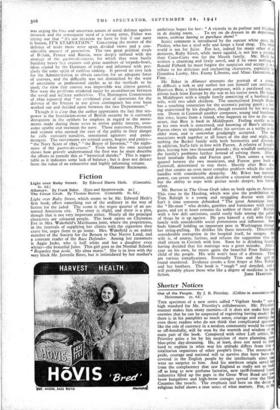Fiction
Light over Ruby Street. By Edward Harris Heth. (Constable. 8s. 6d.) Light over Ruby Street, which seems to be Mr. Edward Heth's first book, offers something out of the ordinary in the way of fiction for the jaded. The scene is the negro quarter of an un- named American city. The story is slight; and there is a plot, though that is not very important either. Nearly all the principal characters are coloured people. The book opens on Christmas Eve in Mrs. Wakefield's Marihuana joint, where the proprietress, in the intervals of supplying her clients with the cigarettes they crave for, urges them to go home. Mrs. Wakefield is an ardent member of the Society for the Return to Our Native Land, and a constant reader of the Race Defender. Among her customers is Aggie Jacks, who is half white and has a daughter even whiter—the beautiful Juice. This girl goes to the Normal School; " Regardez that ecole. My alma mater." She is in love with the very black Mr. Juvenile Bates, but is intimidated by her mother's ambitious hopes for her : " A victrola in de parlour and frigid in de dining room. . . To try on de dresses in de depart stores, without having to purchase them!"
Ironic comment is introduced by the outcast white man, Mr. Plotkin, who has a mad wife and keeps a food shop. The white world is not for Julee. For her, indeed for many other of its denizens, Ruby Street, while more squalid, is not less a paradise than Cuna-Cuna was for the Mouth family. Mr. Heth has written a charming and lively novel, and if he owes nothing to Ronald Firbank he must forgive the suspicion and accept it as a tribute to his delicious and enchanting characters, especially f-. Grandma Looby, Mrs. Fanny Libretto, and Mme.: Geranium, c; Finn. . . .
Mr. Baker in Allanayr attempts the portrait of a geni_ as difficult a task as any author not one himself can undenak, Harrison- Bate, a little-known composer, with a paralysed arm, driven back from Europe by the war to his native town. He lodges in Middleport with a simple family consisting of a husband and wife, with two adult children. The unemployed Joseph Becker has a touching veneration for the eccentric paying guest ; a feel- ing understood by his daughter, though resented by his wife at: son. Down in Cornwall another composer, young and handsorne this time, learns from a friend, who happens to live in the sum street, that Bate is back in Middleport. Feeling sterile as as his own work is concerned, and knowing of Bate's infirmit Farren obeys an impulse, and offers his services as a scribe to tle- older man, and is somewhat grudgingly accepted. - The tu, musicians work together at all hours of the day and night, dis- turbing the Becker family with both harmonies and discords in addition, Stella falls in love with Farren. A relative of Joseph; dies, leaving him two thousand pounds • this windfall complicate, the family's problems further instead of solving them. After brief interlude Stella and Farren part. Then comes a terrifi, quarrel betwen the two musicians, and Farren goes back tc Cornwall, determined to stay there. Shortly after Bate dies, and that creates an even more complex problem which the author handles with considerable dexterity. Mr. Baker has narrative power, can create tension, and dissolve a situation neatly enougi but the ability to cope with genius needs deeper, less limitcc talent.
Mr. Burton in The Great Grab takes us back again_to Americs This time in the Harding, which was also the -prohibition eN Tom Raleigh is a young and struggling doctor with ideal,
Isn't it time someone debunked " The great American here. the " He-man " who drinks, gambles and fornicates with terrif: gusto, and yet at heart remains the noblest of them all? Raleigz, with a few deft omissions, could easily hide among the gallery of thugs he is up against. He gets himself a rich wife from family with considerable social pretensions and influence. S finds himself holding an important post in Washington throu her string-pulling. He dislikes life there intensely. -Discoverin considerable corruption in the hospital itself, he resigns. H. wife is, of course, furious, and refuses the suggestion that she shall return to. Corinth with him. Soon he is drinking heavily having decided that his marriage was a great mistake. After s . year on his own, he meets again the beautiful Fran Siddon—r child of the people. His wife won't hear of a divorce. There are various complications. Eventually Tom and the girl are found murdered. Evidence crooks a firm finger at Mrs. Raleig and her brothers. The book is " tough " and detailed, and will probably please those who like a degree of medicine in the.


























 Previous page
Previous page